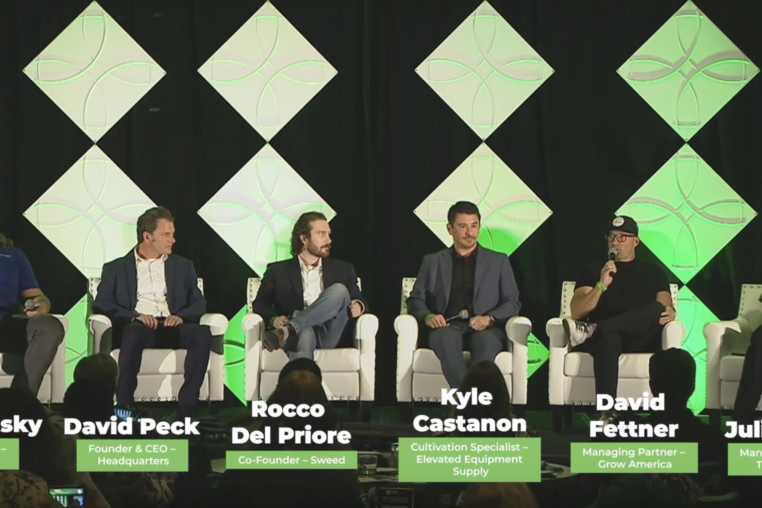At last week’s Benzinga Cannabis Capital Conference in Chicago, one of the most forward-looking conversations centered around a deceptively simple question: Is AI part of your strategy?
Moderated by Julie Valdes of Thompson Hine, the panel featured David Belsky (FlowerHire), Rocco Del Priore (Sweed), Kyle Castanon (Elevated Equipment Supply), David Fettner (Grow America) and David Peck (Headquarters). Across cultivation, HR, retail, finance and compliance, the group explored how AI is already reshaping operations across the cannabis supply chain—and where it might go next.
AI Is Already Here (And So Is The Confusion)
While some operators still view artificial intelligence as a vague or futuristic concept, panelists were clear: AI is already making an impact.
“AI is not going to take your job,” said Castanon. “But the guy who knows AI is going to take your job.”
For cannabis companies, that means getting comfortable with the tools now. Castanon emphasized how his company’s cultivation clients are using AI to make crucial decisions in real time. For instance:
“We’re really looking at about a quarter million lines of data for every harvest… there’s like a 2-day window of when you should be pruning your plants… if you don’t hit that, you’ll lose about 20% of your yields.”
Fettner backed this up from a facility design perspective:
“AI will probably pick [up disease] 10 to 14 days sooner… and that eventually all goes to the bottom line and saves the harvest.”
In other words, the tech isn’t theoretical. It’s practical. It’s measurable. And it’s being used today.
Data: The Weakest Link
Still, AI is only as good as the data it ingests. And for cannabis, that’s a problem.
“The biggest challenge is the messy data across different systems,” said Peck. “AI can only work as well as the data that it has in the system.”
That sentiment was echoed across the panel. Disconnected POS, ERP and HR systems make implementation difficult. According to Del Priore:
“Right now, you have a bunch of systems that function like a car. You’re driving them. In the future, AI will do a lot of that work for you. But if you’re on the racetrack, do you want to be driving a self-driving Corolla or a self-driving Ferrari?”
Translation: You need both the horsepower and the data clarity to compete.
Retail And Marketing: Low-Hanging Fruit
While cultivation gets a lot of attention, retail may offer the easiest entry point.
Del Priore described a world of hyperpersonalized outreach: emails and messages that understand customer preferences and prompt them to act, automatically.
“There’s a lot of smaller operators that don’t have a marketing team… What happens when the AI starts to suggest those things for you and reduce it down to a click?”
AI-driven POS integrations can even predict what a customer is about to buy:
“From a customer perspective… there’s always like this eureka moment that our customers have when AI pays off in a big way,” said Castanon.
Peck highlighted another area: wholesale orders. His company has implemented AI substitution logic to help brands fill multi-store orders more efficiently:
“If Blue Dream is out of stock, it finds something similar with the same THC percentage… before, people were sort of losing those orders.”
AI In HR: Talent Strategy Meets Automation
Belsky offered insight into how lean cannabis HR teams can deploy AI to extend their reach.
“There’s tools now where the first interview for a job, especially an hourly job, is with one of these sorts of AI agents that sounds super personal and is responsive,” he said.
These bots can ask and answer basic employee questions, flag learning gaps, and even conduct initial screens, freeing up time for hiring managers.
Peck added that strategic alignment is key:
“I think internally it should be the CEO [leading AI adoption] because it’s such an important decision… You want the CEO to be really bought into that.”
The Bottom Line: Don’t Wait
Every speaker stressed urgency. Whether it’s internal policy development, data cleansing, or tool selection, companies must begin preparing now.
“In a few years, if you’re not using some kind of AI tool, you’re a dinosaur,” said Castanon.
AI won’t fix a broken business model. But it can sharpen strategy, reveal patterns, and supercharge productivity. And in an industry known for thin margins and constant change, that might be the difference between survival and extinction
This content was partially produced with the help of AI tools and was reviewed and published by Benzinga editors.
Market News and Data brought to you by Benzinga APIs
© 2025 Benzinga.com. Benzinga does not provide investment advice. All rights reserved.
Cannabis execs say AI is here to stay. At Benzinga’s Chicago event, leaders shared how it’s transforming ops—if your data is ready. Read More


